Entrepreneurship and Small Business Management
VerifiedAdded on 2023/06/13
|14
|3526
|121
AI Summary
This report discusses the definition and scope of entrepreneurship, types of entrepreneurial ventures and typology, differences and similarities of different entrepreneurial ventures, impact of micro and small business on the economy, the importance of small businesses and business start-ups to the growth of the social economy, and characteristics and traits of entrepreneur. It also includes subject matter related to entrepreneurship and small business management.
Contribute Materials
Your contribution can guide someone’s learning journey. Share your
documents today.

Entrepreneurship and
small Business
management
small Business
management
Secure Best Marks with AI Grader
Need help grading? Try our AI Grader for instant feedback on your assignments.
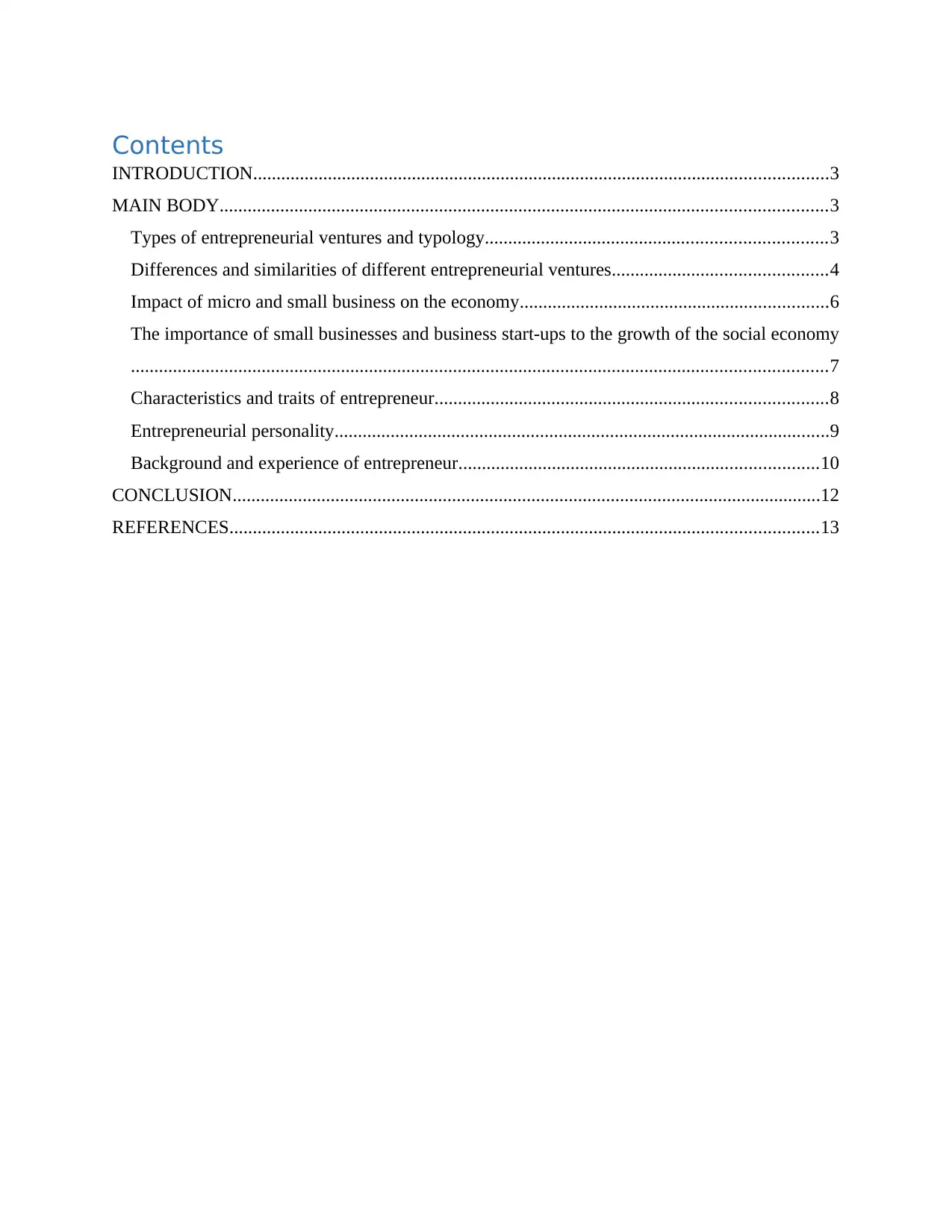
Contents
INTRODUCTION...........................................................................................................................3
MAIN BODY..................................................................................................................................3
Types of entrepreneurial ventures and typology.........................................................................3
Differences and similarities of different entrepreneurial ventures..............................................4
Impact of micro and small business on the economy..................................................................6
The importance of small businesses and business start-ups to the growth of the social economy
.....................................................................................................................................................7
Characteristics and traits of entrepreneur....................................................................................8
Entrepreneurial personality..........................................................................................................9
Background and experience of entrepreneur.............................................................................10
CONCLUSION..............................................................................................................................12
REFERENCES..............................................................................................................................13
INTRODUCTION...........................................................................................................................3
MAIN BODY..................................................................................................................................3
Types of entrepreneurial ventures and typology.........................................................................3
Differences and similarities of different entrepreneurial ventures..............................................4
Impact of micro and small business on the economy..................................................................6
The importance of small businesses and business start-ups to the growth of the social economy
.....................................................................................................................................................7
Characteristics and traits of entrepreneur....................................................................................8
Entrepreneurial personality..........................................................................................................9
Background and experience of entrepreneur.............................................................................10
CONCLUSION..............................................................................................................................12
REFERENCES..............................................................................................................................13
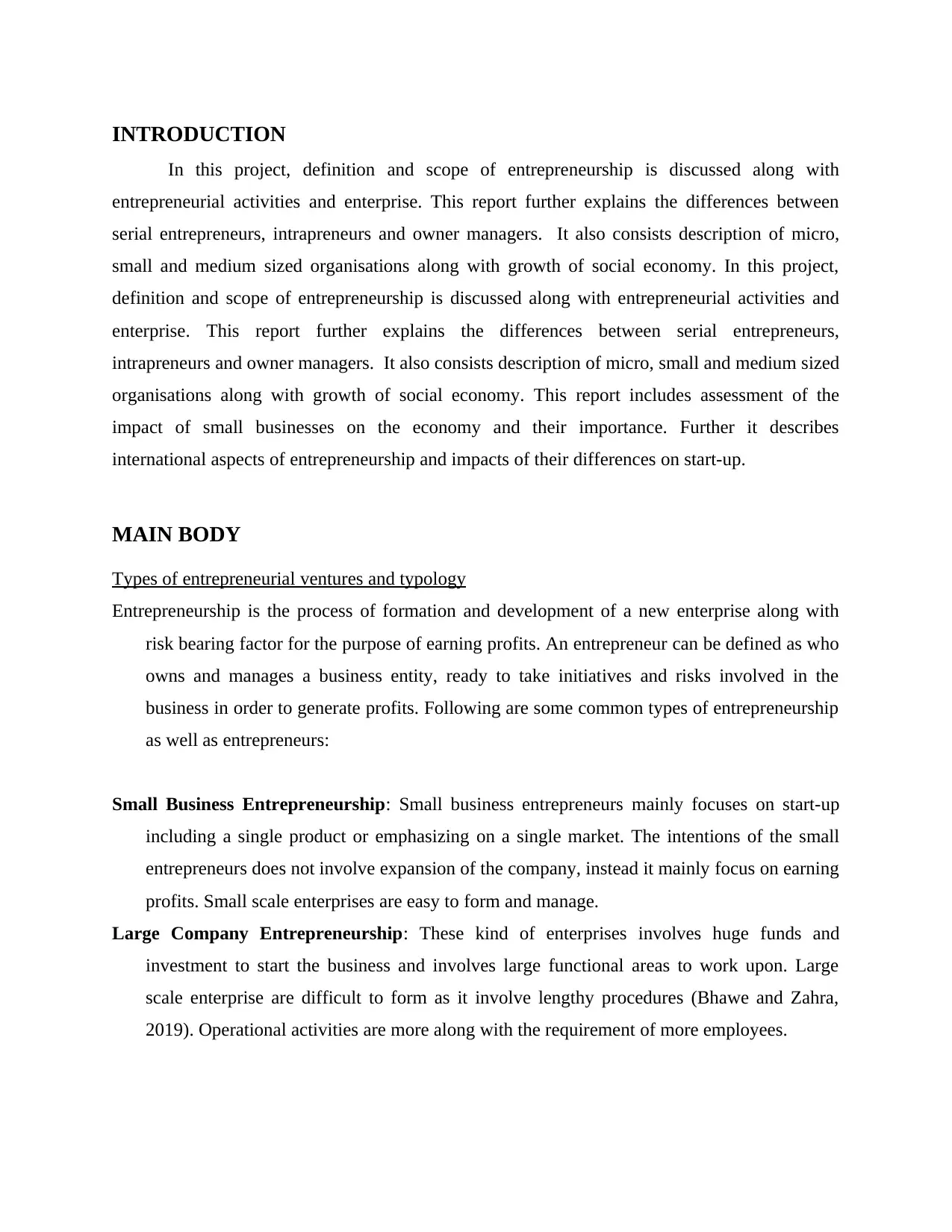
INTRODUCTION
In this project, definition and scope of entrepreneurship is discussed along with
entrepreneurial activities and enterprise. This report further explains the differences between
serial entrepreneurs, intrapreneurs and owner managers. It also consists description of micro,
small and medium sized organisations along with growth of social economy. In this project,
definition and scope of entrepreneurship is discussed along with entrepreneurial activities and
enterprise. This report further explains the differences between serial entrepreneurs,
intrapreneurs and owner managers. It also consists description of micro, small and medium sized
organisations along with growth of social economy. This report includes assessment of the
impact of small businesses on the economy and their importance. Further it describes
international aspects of entrepreneurship and impacts of their differences on start-up.
MAIN BODY
Types of entrepreneurial ventures and typology
Entrepreneurship is the process of formation and development of a new enterprise along with
risk bearing factor for the purpose of earning profits. An entrepreneur can be defined as who
owns and manages a business entity, ready to take initiatives and risks involved in the
business in order to generate profits. Following are some common types of entrepreneurship
as well as entrepreneurs:
Small Business Entrepreneurship: Small business entrepreneurs mainly focuses on start-up
including a single product or emphasizing on a single market. The intentions of the small
entrepreneurs does not involve expansion of the company, instead it mainly focus on earning
profits. Small scale enterprises are easy to form and manage.
Large Company Entrepreneurship: These kind of enterprises involves huge funds and
investment to start the business and involves large functional areas to work upon. Large
scale enterprise are difficult to form as it involve lengthy procedures (Bhawe and Zahra,
2019). Operational activities are more along with the requirement of more employees.
In this project, definition and scope of entrepreneurship is discussed along with
entrepreneurial activities and enterprise. This report further explains the differences between
serial entrepreneurs, intrapreneurs and owner managers. It also consists description of micro,
small and medium sized organisations along with growth of social economy. In this project,
definition and scope of entrepreneurship is discussed along with entrepreneurial activities and
enterprise. This report further explains the differences between serial entrepreneurs,
intrapreneurs and owner managers. It also consists description of micro, small and medium sized
organisations along with growth of social economy. This report includes assessment of the
impact of small businesses on the economy and their importance. Further it describes
international aspects of entrepreneurship and impacts of their differences on start-up.
MAIN BODY
Types of entrepreneurial ventures and typology
Entrepreneurship is the process of formation and development of a new enterprise along with
risk bearing factor for the purpose of earning profits. An entrepreneur can be defined as who
owns and manages a business entity, ready to take initiatives and risks involved in the
business in order to generate profits. Following are some common types of entrepreneurship
as well as entrepreneurs:
Small Business Entrepreneurship: Small business entrepreneurs mainly focuses on start-up
including a single product or emphasizing on a single market. The intentions of the small
entrepreneurs does not involve expansion of the company, instead it mainly focus on earning
profits. Small scale enterprises are easy to form and manage.
Large Company Entrepreneurship: These kind of enterprises involves huge funds and
investment to start the business and involves large functional areas to work upon. Large
scale enterprise are difficult to form as it involve lengthy procedures (Bhawe and Zahra,
2019). Operational activities are more along with the requirement of more employees.
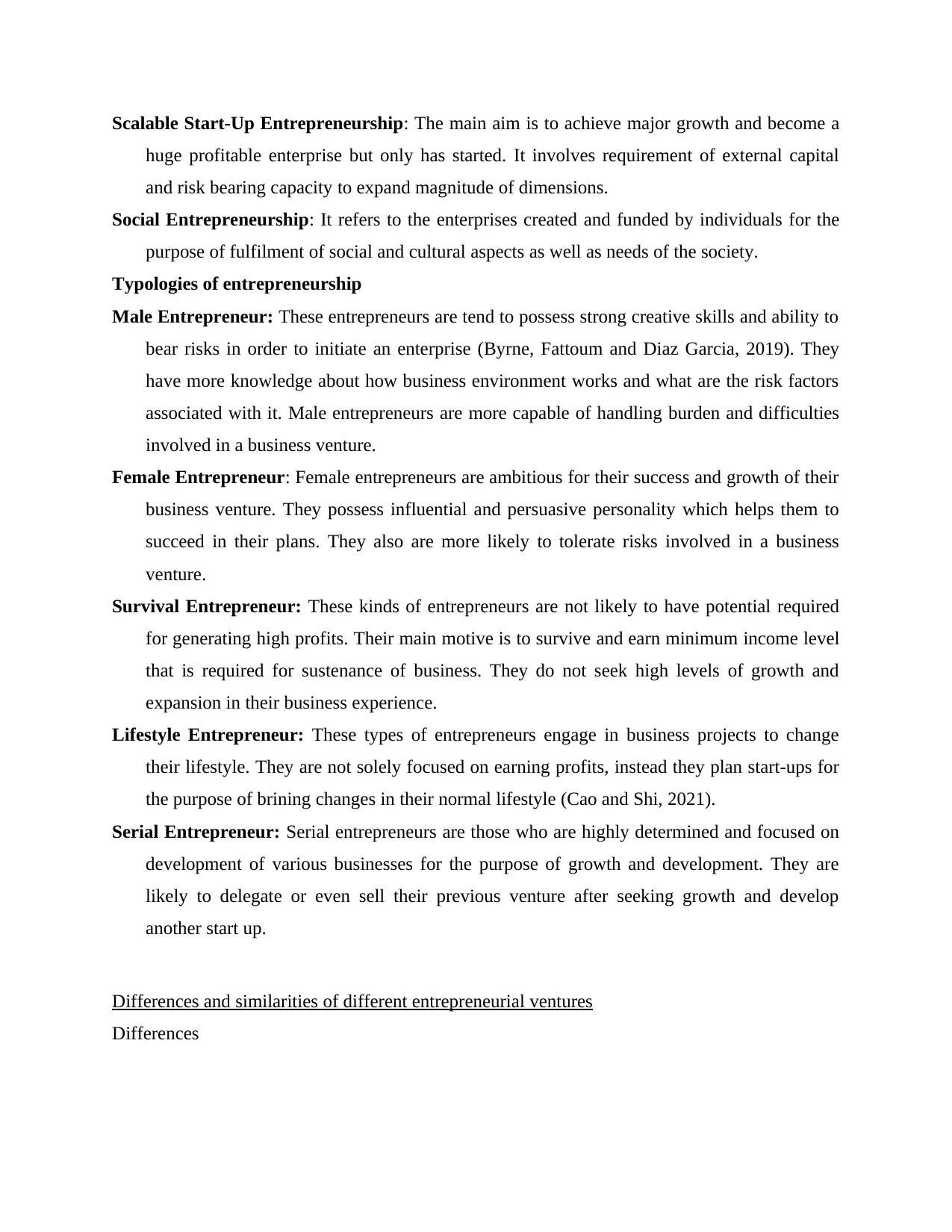
Scalable Start-Up Entrepreneurship: The main aim is to achieve major growth and become a
huge profitable enterprise but only has started. It involves requirement of external capital
and risk bearing capacity to expand magnitude of dimensions.
Social Entrepreneurship: It refers to the enterprises created and funded by individuals for the
purpose of fulfilment of social and cultural aspects as well as needs of the society.
Typologies of entrepreneurship
Male Entrepreneur: These entrepreneurs are tend to possess strong creative skills and ability to
bear risks in order to initiate an enterprise (Byrne, Fattoum and Diaz Garcia, 2019). They
have more knowledge about how business environment works and what are the risk factors
associated with it. Male entrepreneurs are more capable of handling burden and difficulties
involved in a business venture.
Female Entrepreneur: Female entrepreneurs are ambitious for their success and growth of their
business venture. They possess influential and persuasive personality which helps them to
succeed in their plans. They also are more likely to tolerate risks involved in a business
venture.
Survival Entrepreneur: These kinds of entrepreneurs are not likely to have potential required
for generating high profits. Their main motive is to survive and earn minimum income level
that is required for sustenance of business. They do not seek high levels of growth and
expansion in their business experience.
Lifestyle Entrepreneur: These types of entrepreneurs engage in business projects to change
their lifestyle. They are not solely focused on earning profits, instead they plan start-ups for
the purpose of brining changes in their normal lifestyle (Cao and Shi, 2021).
Serial Entrepreneur: Serial entrepreneurs are those who are highly determined and focused on
development of various businesses for the purpose of growth and development. They are
likely to delegate or even sell their previous venture after seeking growth and develop
another start up.
Differences and similarities of different entrepreneurial ventures
Differences
huge profitable enterprise but only has started. It involves requirement of external capital
and risk bearing capacity to expand magnitude of dimensions.
Social Entrepreneurship: It refers to the enterprises created and funded by individuals for the
purpose of fulfilment of social and cultural aspects as well as needs of the society.
Typologies of entrepreneurship
Male Entrepreneur: These entrepreneurs are tend to possess strong creative skills and ability to
bear risks in order to initiate an enterprise (Byrne, Fattoum and Diaz Garcia, 2019). They
have more knowledge about how business environment works and what are the risk factors
associated with it. Male entrepreneurs are more capable of handling burden and difficulties
involved in a business venture.
Female Entrepreneur: Female entrepreneurs are ambitious for their success and growth of their
business venture. They possess influential and persuasive personality which helps them to
succeed in their plans. They also are more likely to tolerate risks involved in a business
venture.
Survival Entrepreneur: These kinds of entrepreneurs are not likely to have potential required
for generating high profits. Their main motive is to survive and earn minimum income level
that is required for sustenance of business. They do not seek high levels of growth and
expansion in their business experience.
Lifestyle Entrepreneur: These types of entrepreneurs engage in business projects to change
their lifestyle. They are not solely focused on earning profits, instead they plan start-ups for
the purpose of brining changes in their normal lifestyle (Cao and Shi, 2021).
Serial Entrepreneur: Serial entrepreneurs are those who are highly determined and focused on
development of various businesses for the purpose of growth and development. They are
likely to delegate or even sell their previous venture after seeking growth and develop
another start up.
Differences and similarities of different entrepreneurial ventures
Differences
Secure Best Marks with AI Grader
Need help grading? Try our AI Grader for instant feedback on your assignments.
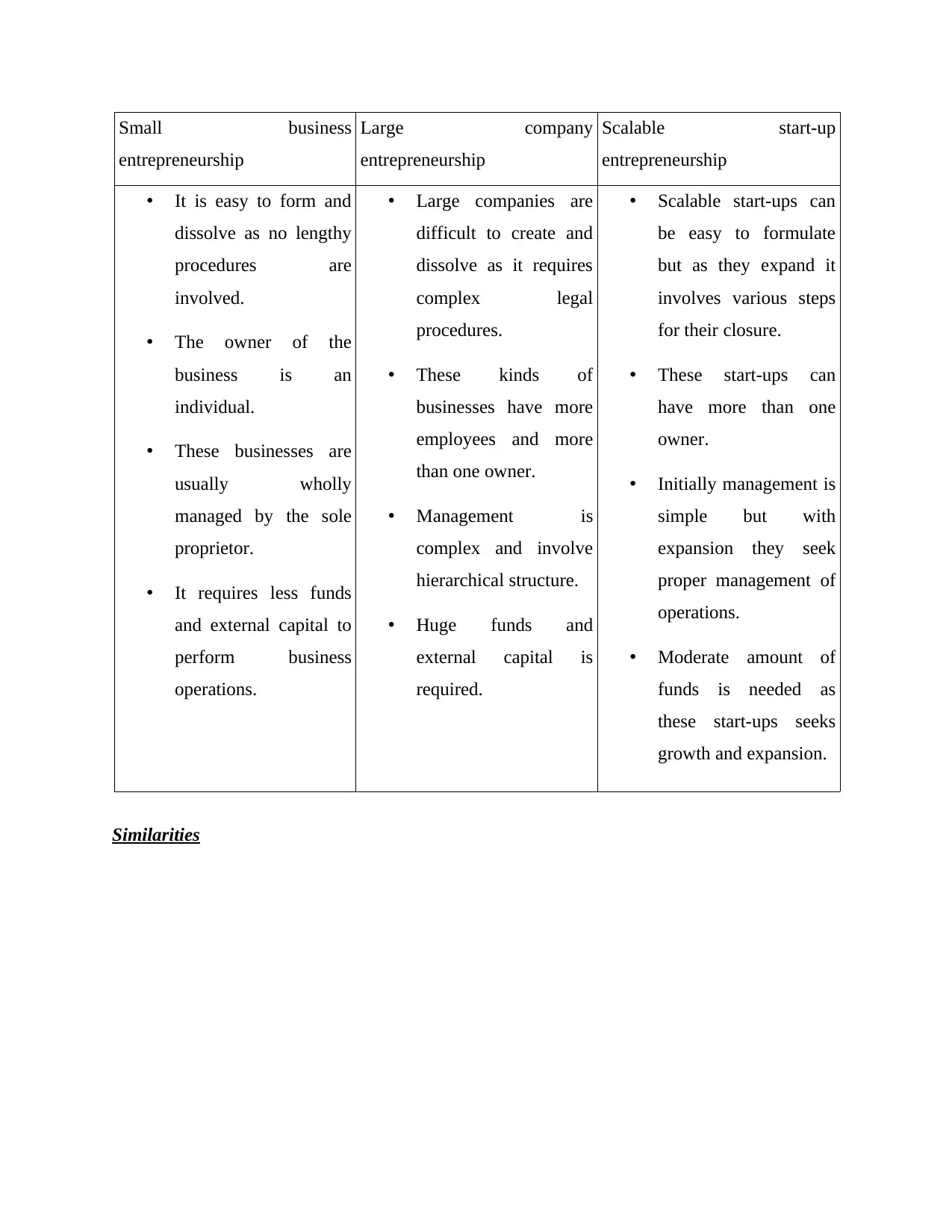
Small business
entrepreneurship
Large company
entrepreneurship
Scalable start-up
entrepreneurship
• It is easy to form and
dissolve as no lengthy
procedures are
involved.
• The owner of the
business is an
individual.
• These businesses are
usually wholly
managed by the sole
proprietor.
• It requires less funds
and external capital to
perform business
operations.
• Large companies are
difficult to create and
dissolve as it requires
complex legal
procedures.
• These kinds of
businesses have more
employees and more
than one owner.
• Management is
complex and involve
hierarchical structure.
• Huge funds and
external capital is
required.
• Scalable start-ups can
be easy to formulate
but as they expand it
involves various steps
for their closure.
• These start-ups can
have more than one
owner.
• Initially management is
simple but with
expansion they seek
proper management of
operations.
• Moderate amount of
funds is needed as
these start-ups seeks
growth and expansion.
Similarities
• Growth and Development Opportunities: The major similarity among all
entrepreneurial ventures is that a business environment offers great opportunities for
expansion and experience to grow in dynamic surroundings (Dencker and et.al., 2021).
Engaging in business activities enhance the entrepreneurial skills as well as interpersonal
skills of an individual.
• Risk Factors: No matter how big or small an organisational structure there are always
some risk factors associated with a business venture. A business must assess this risk
factors in order to widen the scope of development of a business idea.
entrepreneurship
Large company
entrepreneurship
Scalable start-up
entrepreneurship
• It is easy to form and
dissolve as no lengthy
procedures are
involved.
• The owner of the
business is an
individual.
• These businesses are
usually wholly
managed by the sole
proprietor.
• It requires less funds
and external capital to
perform business
operations.
• Large companies are
difficult to create and
dissolve as it requires
complex legal
procedures.
• These kinds of
businesses have more
employees and more
than one owner.
• Management is
complex and involve
hierarchical structure.
• Huge funds and
external capital is
required.
• Scalable start-ups can
be easy to formulate
but as they expand it
involves various steps
for their closure.
• These start-ups can
have more than one
owner.
• Initially management is
simple but with
expansion they seek
proper management of
operations.
• Moderate amount of
funds is needed as
these start-ups seeks
growth and expansion.
Similarities
• Growth and Development Opportunities: The major similarity among all
entrepreneurial ventures is that a business environment offers great opportunities for
expansion and experience to grow in dynamic surroundings (Dencker and et.al., 2021).
Engaging in business activities enhance the entrepreneurial skills as well as interpersonal
skills of an individual.
• Risk Factors: No matter how big or small an organisational structure there are always
some risk factors associated with a business venture. A business must assess this risk
factors in order to widen the scope of development of a business idea.
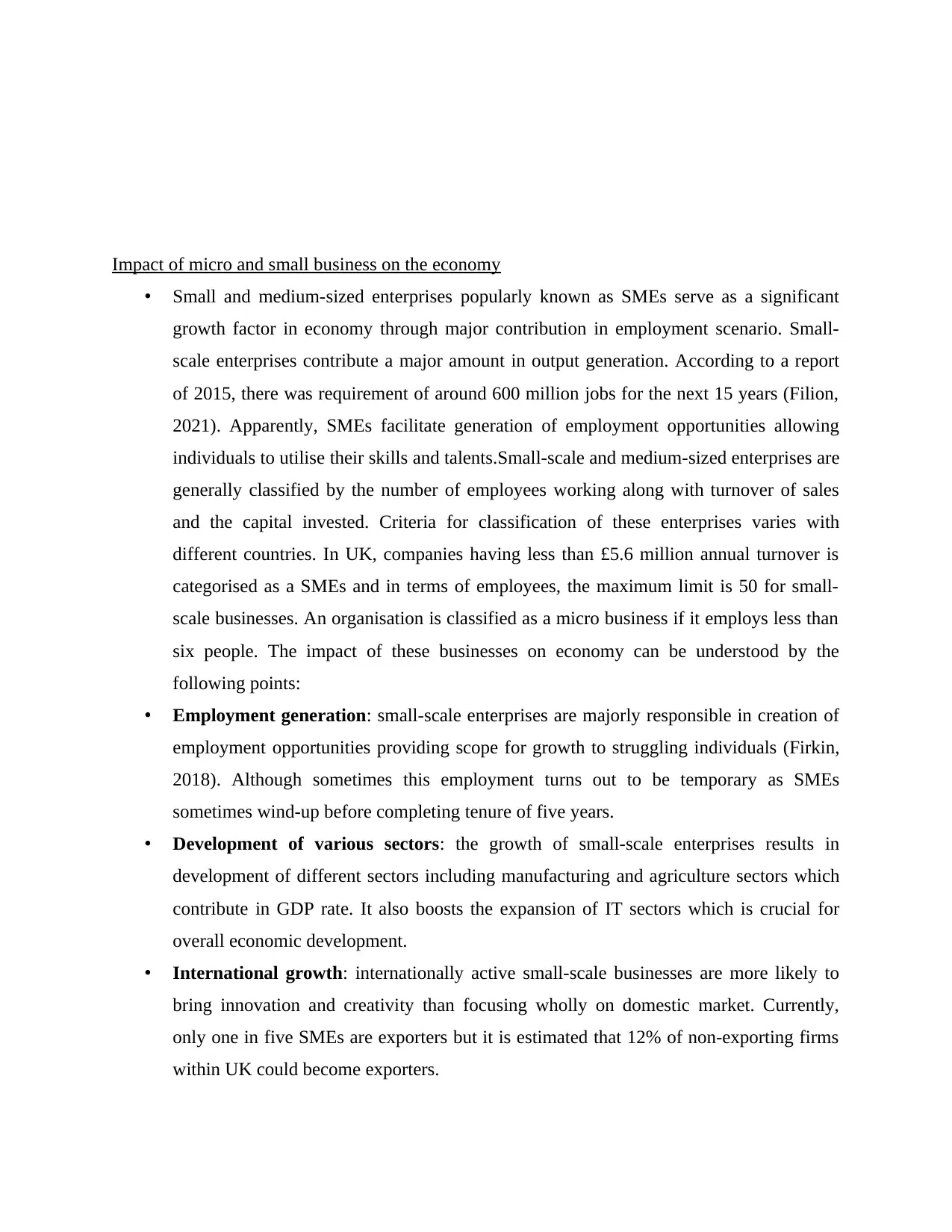
• Purpose of Earning Profits: The main motive of every entrepreneur is to maximise
their profitability margins and wealth of their organisation in the long run (Ebrahimi and
et.al., 2019). No business is formulated only for the purpose of sustenance, a business is
developed to fulfil the objective of money making and generating high revenues.
Impact of micro and small business on the economy
• Small and medium-sized enterprises popularly known as SMEs serve as a significant
growth factor in economy through major contribution in employment scenario. Small-
scale enterprises contribute a major amount in output generation. According to a report
of 2015, there was requirement of around 600 million jobs for the next 15 years (Filion,
2021). Apparently, SMEs facilitate generation of employment opportunities allowing
individuals to utilise their skills and talents.Small-scale and medium-sized enterprises are
generally classified by the number of employees working along with turnover of sales
and the capital invested. Criteria for classification of these enterprises varies with
different countries. In UK, companies having less than £5.6 million annual turnover is
categorised as a SMEs and in terms of employees, the maximum limit is 50 for small-
scale businesses. An organisation is classified as a micro business if it employs less than
six people. The impact of these businesses on economy can be understood by the
following points:
• Employment generation: small-scale enterprises are majorly responsible in creation of
employment opportunities providing scope for growth to struggling individuals (Firkin,
2018). Although sometimes this employment turns out to be temporary as SMEs
sometimes wind-up before completing tenure of five years.
• Development of various sectors: the growth of small-scale enterprises results in
development of different sectors including manufacturing and agriculture sectors which
contribute in GDP rate. It also boosts the expansion of IT sectors which is crucial for
overall economic development.
• International growth: internationally active small-scale businesses are more likely to
bring innovation and creativity than focusing wholly on domestic market. Currently,
only one in five SMEs are exporters but it is estimated that 12% of non-exporting firms
within UK could become exporters.
their profitability margins and wealth of their organisation in the long run (Ebrahimi and
et.al., 2019). No business is formulated only for the purpose of sustenance, a business is
developed to fulfil the objective of money making and generating high revenues.
Impact of micro and small business on the economy
• Small and medium-sized enterprises popularly known as SMEs serve as a significant
growth factor in economy through major contribution in employment scenario. Small-
scale enterprises contribute a major amount in output generation. According to a report
of 2015, there was requirement of around 600 million jobs for the next 15 years (Filion,
2021). Apparently, SMEs facilitate generation of employment opportunities allowing
individuals to utilise their skills and talents.Small-scale and medium-sized enterprises are
generally classified by the number of employees working along with turnover of sales
and the capital invested. Criteria for classification of these enterprises varies with
different countries. In UK, companies having less than £5.6 million annual turnover is
categorised as a SMEs and in terms of employees, the maximum limit is 50 for small-
scale businesses. An organisation is classified as a micro business if it employs less than
six people. The impact of these businesses on economy can be understood by the
following points:
• Employment generation: small-scale enterprises are majorly responsible in creation of
employment opportunities providing scope for growth to struggling individuals (Firkin,
2018). Although sometimes this employment turns out to be temporary as SMEs
sometimes wind-up before completing tenure of five years.
• Development of various sectors: the growth of small-scale enterprises results in
development of different sectors including manufacturing and agriculture sectors which
contribute in GDP rate. It also boosts the expansion of IT sectors which is crucial for
overall economic development.
• International growth: internationally active small-scale businesses are more likely to
bring innovation and creativity than focusing wholly on domestic market. Currently,
only one in five SMEs are exporters but it is estimated that 12% of non-exporting firms
within UK could become exporters.
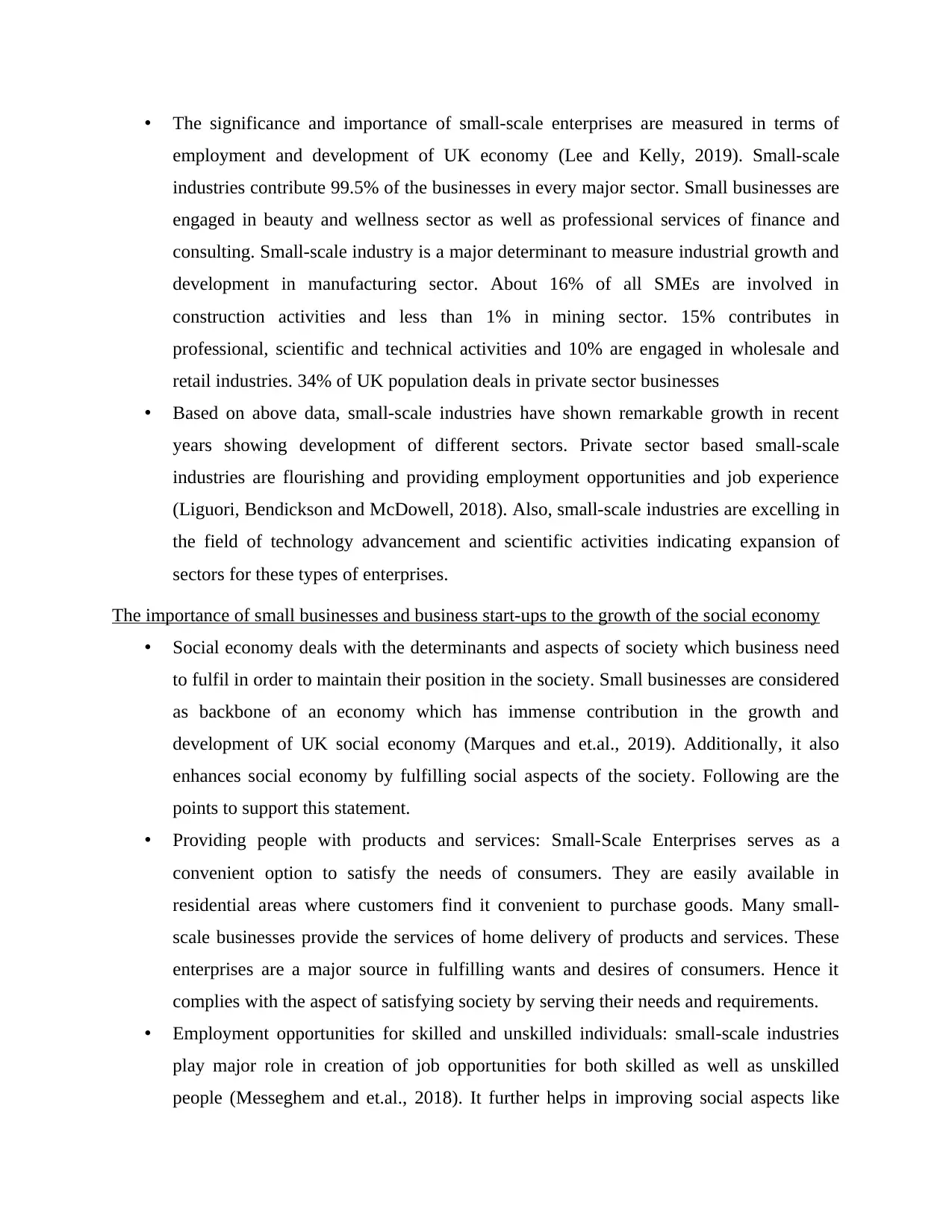
• The significance and importance of small-scale enterprises are measured in terms of
employment and development of UK economy (Lee and Kelly, 2019). Small-scale
industries contribute 99.5% of the businesses in every major sector. Small businesses are
engaged in beauty and wellness sector as well as professional services of finance and
consulting. Small-scale industry is a major determinant to measure industrial growth and
development in manufacturing sector. About 16% of all SMEs are involved in
construction activities and less than 1% in mining sector. 15% contributes in
professional, scientific and technical activities and 10% are engaged in wholesale and
retail industries. 34% of UK population deals in private sector businesses
• Based on above data, small-scale industries have shown remarkable growth in recent
years showing development of different sectors. Private sector based small-scale
industries are flourishing and providing employment opportunities and job experience
(Liguori, Bendickson and McDowell, 2018). Also, small-scale industries are excelling in
the field of technology advancement and scientific activities indicating expansion of
sectors for these types of enterprises.
The importance of small businesses and business start-ups to the growth of the social economy
• Social economy deals with the determinants and aspects of society which business need
to fulfil in order to maintain their position in the society. Small businesses are considered
as backbone of an economy which has immense contribution in the growth and
development of UK social economy (Marques and et.al., 2019). Additionally, it also
enhances social economy by fulfilling social aspects of the society. Following are the
points to support this statement.
• Providing people with products and services: Small-Scale Enterprises serves as a
convenient option to satisfy the needs of consumers. They are easily available in
residential areas where customers find it convenient to purchase goods. Many small-
scale businesses provide the services of home delivery of products and services. These
enterprises are a major source in fulfilling wants and desires of consumers. Hence it
complies with the aspect of satisfying society by serving their needs and requirements.
• Employment opportunities for skilled and unskilled individuals: small-scale industries
play major role in creation of job opportunities for both skilled as well as unskilled
people (Messeghem and et.al., 2018). It further helps in improving social aspects like
employment and development of UK economy (Lee and Kelly, 2019). Small-scale
industries contribute 99.5% of the businesses in every major sector. Small businesses are
engaged in beauty and wellness sector as well as professional services of finance and
consulting. Small-scale industry is a major determinant to measure industrial growth and
development in manufacturing sector. About 16% of all SMEs are involved in
construction activities and less than 1% in mining sector. 15% contributes in
professional, scientific and technical activities and 10% are engaged in wholesale and
retail industries. 34% of UK population deals in private sector businesses
• Based on above data, small-scale industries have shown remarkable growth in recent
years showing development of different sectors. Private sector based small-scale
industries are flourishing and providing employment opportunities and job experience
(Liguori, Bendickson and McDowell, 2018). Also, small-scale industries are excelling in
the field of technology advancement and scientific activities indicating expansion of
sectors for these types of enterprises.
The importance of small businesses and business start-ups to the growth of the social economy
• Social economy deals with the determinants and aspects of society which business need
to fulfil in order to maintain their position in the society. Small businesses are considered
as backbone of an economy which has immense contribution in the growth and
development of UK social economy (Marques and et.al., 2019). Additionally, it also
enhances social economy by fulfilling social aspects of the society. Following are the
points to support this statement.
• Providing people with products and services: Small-Scale Enterprises serves as a
convenient option to satisfy the needs of consumers. They are easily available in
residential areas where customers find it convenient to purchase goods. Many small-
scale businesses provide the services of home delivery of products and services. These
enterprises are a major source in fulfilling wants and desires of consumers. Hence it
complies with the aspect of satisfying society by serving their needs and requirements.
• Employment opportunities for skilled and unskilled individuals: small-scale industries
play major role in creation of job opportunities for both skilled as well as unskilled
people (Messeghem and et.al., 2018). It further helps in improving social aspects like
Paraphrase This Document
Need a fresh take? Get an instant paraphrase of this document with our AI Paraphraser
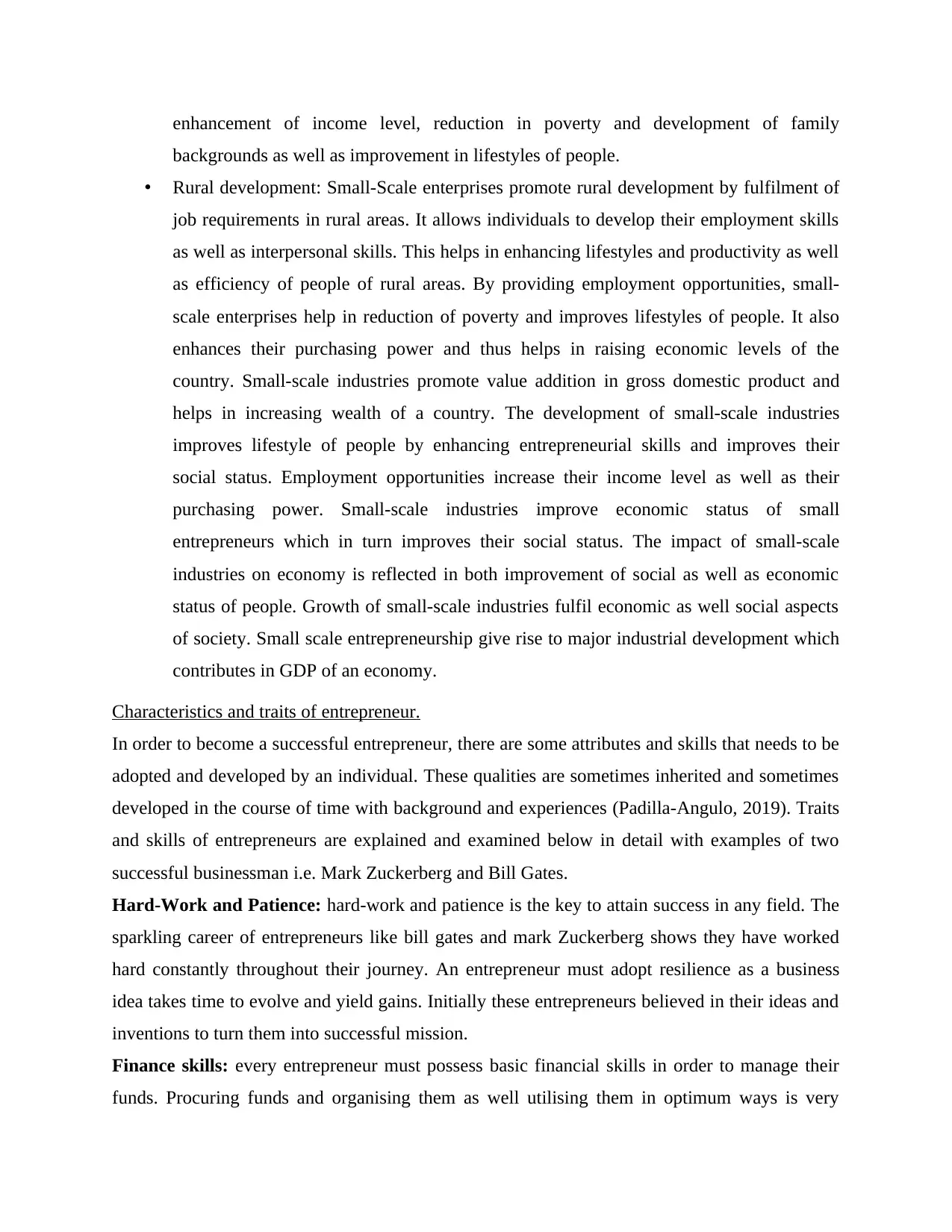
enhancement of income level, reduction in poverty and development of family
backgrounds as well as improvement in lifestyles of people.
• Rural development: Small-Scale enterprises promote rural development by fulfilment of
job requirements in rural areas. It allows individuals to develop their employment skills
as well as interpersonal skills. This helps in enhancing lifestyles and productivity as well
as efficiency of people of rural areas. By providing employment opportunities, small-
scale enterprises help in reduction of poverty and improves lifestyles of people. It also
enhances their purchasing power and thus helps in raising economic levels of the
country. Small-scale industries promote value addition in gross domestic product and
helps in increasing wealth of a country. The development of small-scale industries
improves lifestyle of people by enhancing entrepreneurial skills and improves their
social status. Employment opportunities increase their income level as well as their
purchasing power. Small-scale industries improve economic status of small
entrepreneurs which in turn improves their social status. The impact of small-scale
industries on economy is reflected in both improvement of social as well as economic
status of people. Growth of small-scale industries fulfil economic as well social aspects
of society. Small scale entrepreneurship give rise to major industrial development which
contributes in GDP of an economy.
Characteristics and traits of entrepreneur.
In order to become a successful entrepreneur, there are some attributes and skills that needs to be
adopted and developed by an individual. These qualities are sometimes inherited and sometimes
developed in the course of time with background and experiences (Padilla-Angulo, 2019). Traits
and skills of entrepreneurs are explained and examined below in detail with examples of two
successful businessman i.e. Mark Zuckerberg and Bill Gates.
Hard-Work and Patience: hard-work and patience is the key to attain success in any field. The
sparkling career of entrepreneurs like bill gates and mark Zuckerberg shows they have worked
hard constantly throughout their journey. An entrepreneur must adopt resilience as a business
idea takes time to evolve and yield gains. Initially these entrepreneurs believed in their ideas and
inventions to turn them into successful mission.
Finance skills: every entrepreneur must possess basic financial skills in order to manage their
funds. Procuring funds and organising them as well utilising them in optimum ways is very
backgrounds as well as improvement in lifestyles of people.
• Rural development: Small-Scale enterprises promote rural development by fulfilment of
job requirements in rural areas. It allows individuals to develop their employment skills
as well as interpersonal skills. This helps in enhancing lifestyles and productivity as well
as efficiency of people of rural areas. By providing employment opportunities, small-
scale enterprises help in reduction of poverty and improves lifestyles of people. It also
enhances their purchasing power and thus helps in raising economic levels of the
country. Small-scale industries promote value addition in gross domestic product and
helps in increasing wealth of a country. The development of small-scale industries
improves lifestyle of people by enhancing entrepreneurial skills and improves their
social status. Employment opportunities increase their income level as well as their
purchasing power. Small-scale industries improve economic status of small
entrepreneurs which in turn improves their social status. The impact of small-scale
industries on economy is reflected in both improvement of social as well as economic
status of people. Growth of small-scale industries fulfil economic as well social aspects
of society. Small scale entrepreneurship give rise to major industrial development which
contributes in GDP of an economy.
Characteristics and traits of entrepreneur.
In order to become a successful entrepreneur, there are some attributes and skills that needs to be
adopted and developed by an individual. These qualities are sometimes inherited and sometimes
developed in the course of time with background and experiences (Padilla-Angulo, 2019). Traits
and skills of entrepreneurs are explained and examined below in detail with examples of two
successful businessman i.e. Mark Zuckerberg and Bill Gates.
Hard-Work and Patience: hard-work and patience is the key to attain success in any field. The
sparkling career of entrepreneurs like bill gates and mark Zuckerberg shows they have worked
hard constantly throughout their journey. An entrepreneur must adopt resilience as a business
idea takes time to evolve and yield gains. Initially these entrepreneurs believed in their ideas and
inventions to turn them into successful mission.
Finance skills: every entrepreneur must possess basic financial skills in order to manage their
funds. Procuring funds and organising them as well utilising them in optimum ways is very
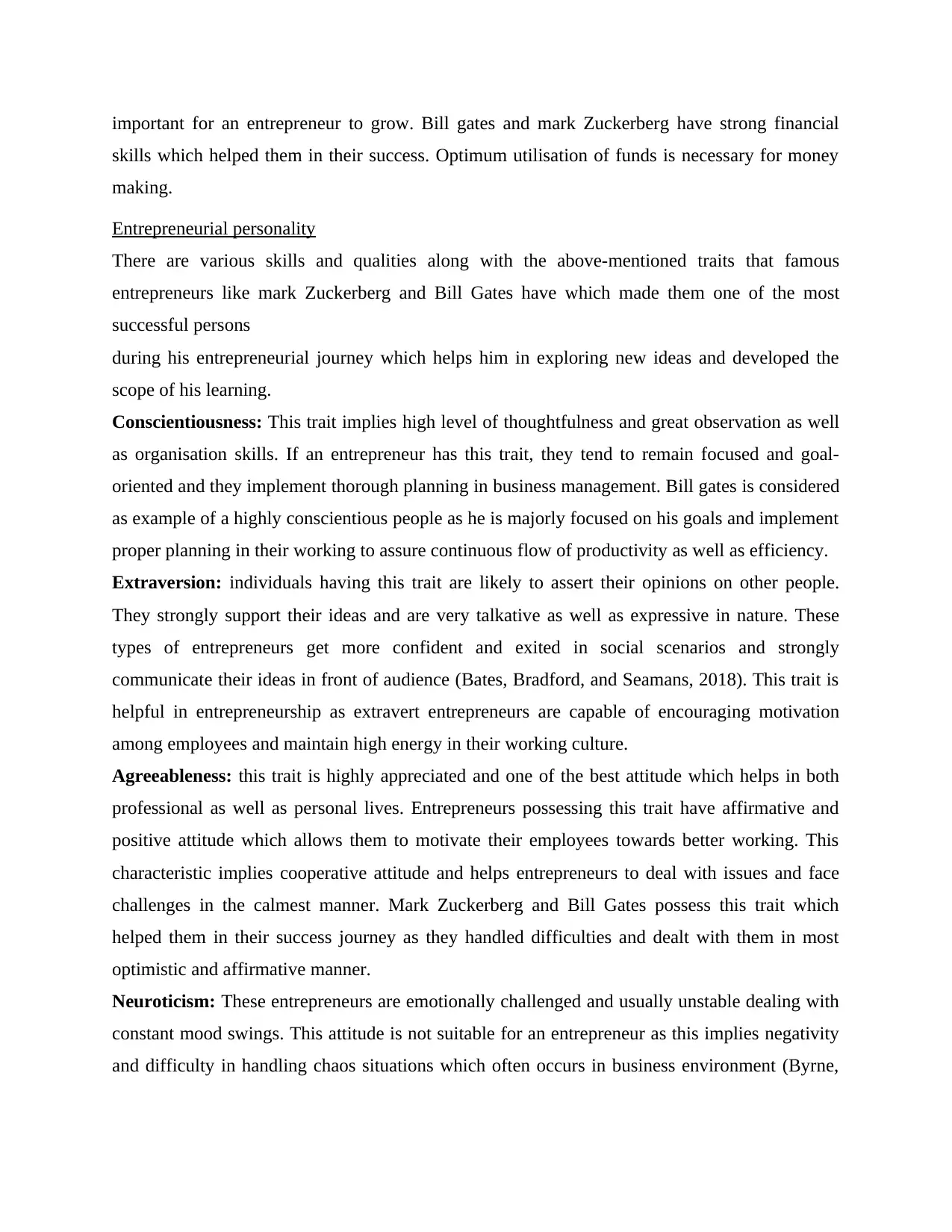
important for an entrepreneur to grow. Bill gates and mark Zuckerberg have strong financial
skills which helped them in their success. Optimum utilisation of funds is necessary for money
making.
Entrepreneurial personality
There are various skills and qualities along with the above-mentioned traits that famous
entrepreneurs like mark Zuckerberg and Bill Gates have which made them one of the most
successful persons
during his entrepreneurial journey which helps him in exploring new ideas and developed the
scope of his learning.
Conscientiousness: This trait implies high level of thoughtfulness and great observation as well
as organisation skills. If an entrepreneur has this trait, they tend to remain focused and goal-
oriented and they implement thorough planning in business management. Bill gates is considered
as example of a highly conscientious people as he is majorly focused on his goals and implement
proper planning in their working to assure continuous flow of productivity as well as efficiency.
Extraversion: individuals having this trait are likely to assert their opinions on other people.
They strongly support their ideas and are very talkative as well as expressive in nature. These
types of entrepreneurs get more confident and exited in social scenarios and strongly
communicate their ideas in front of audience (Bates, Bradford, and Seamans, 2018). This trait is
helpful in entrepreneurship as extravert entrepreneurs are capable of encouraging motivation
among employees and maintain high energy in their working culture.
Agreeableness: this trait is highly appreciated and one of the best attitude which helps in both
professional as well as personal lives. Entrepreneurs possessing this trait have affirmative and
positive attitude which allows them to motivate their employees towards better working. This
characteristic implies cooperative attitude and helps entrepreneurs to deal with issues and face
challenges in the calmest manner. Mark Zuckerberg and Bill Gates possess this trait which
helped them in their success journey as they handled difficulties and dealt with them in most
optimistic and affirmative manner.
Neuroticism: These entrepreneurs are emotionally challenged and usually unstable dealing with
constant mood swings. This attitude is not suitable for an entrepreneur as this implies negativity
and difficulty in handling chaos situations which often occurs in business environment (Byrne,
skills which helped them in their success. Optimum utilisation of funds is necessary for money
making.
Entrepreneurial personality
There are various skills and qualities along with the above-mentioned traits that famous
entrepreneurs like mark Zuckerberg and Bill Gates have which made them one of the most
successful persons
during his entrepreneurial journey which helps him in exploring new ideas and developed the
scope of his learning.
Conscientiousness: This trait implies high level of thoughtfulness and great observation as well
as organisation skills. If an entrepreneur has this trait, they tend to remain focused and goal-
oriented and they implement thorough planning in business management. Bill gates is considered
as example of a highly conscientious people as he is majorly focused on his goals and implement
proper planning in their working to assure continuous flow of productivity as well as efficiency.
Extraversion: individuals having this trait are likely to assert their opinions on other people.
They strongly support their ideas and are very talkative as well as expressive in nature. These
types of entrepreneurs get more confident and exited in social scenarios and strongly
communicate their ideas in front of audience (Bates, Bradford, and Seamans, 2018). This trait is
helpful in entrepreneurship as extravert entrepreneurs are capable of encouraging motivation
among employees and maintain high energy in their working culture.
Agreeableness: this trait is highly appreciated and one of the best attitude which helps in both
professional as well as personal lives. Entrepreneurs possessing this trait have affirmative and
positive attitude which allows them to motivate their employees towards better working. This
characteristic implies cooperative attitude and helps entrepreneurs to deal with issues and face
challenges in the calmest manner. Mark Zuckerberg and Bill Gates possess this trait which
helped them in their success journey as they handled difficulties and dealt with them in most
optimistic and affirmative manner.
Neuroticism: These entrepreneurs are emotionally challenged and usually unstable dealing with
constant mood swings. This attitude is not suitable for an entrepreneur as this implies negativity
and difficulty in handling chaos situations which often occurs in business environment (Byrne,

Fattoum and Diaz Garcia, 2019). Also, entrepreneurs having neurotic attitude are not capable of
promoting motivation as they often deal with anxiety and insipidity.
Background and experience of entrepreneur.
The success of an entrepreneur depends on numerous factors including their personal
background and various experiences throughout life. With the relevant examples of renowned
entrepreneurs like Mark Zuckerberg and Bill Gates, these factors are elaborated in detail.
Mark Zuckerberg
Background:
He learned Atari BASIC Programming in 1990s from his father and later his father got him a
private tutor for the purpose of knowledge in software development. The first software program
that he built was ZuckNet at the age of 12. Strong background and family support allowed him to
follow his interest and seek growth in programming.
Experience:
promoting motivation as they often deal with anxiety and insipidity.
Background and experience of entrepreneur.
The success of an entrepreneur depends on numerous factors including their personal
background and various experiences throughout life. With the relevant examples of renowned
entrepreneurs like Mark Zuckerberg and Bill Gates, these factors are elaborated in detail.
Mark Zuckerberg
Background:
He learned Atari BASIC Programming in 1990s from his father and later his father got him a
private tutor for the purpose of knowledge in software development. The first software program
that he built was ZuckNet at the age of 12. Strong background and family support allowed him to
follow his interest and seek growth in programming.
Experience:
Secure Best Marks with AI Grader
Need help grading? Try our AI Grader for instant feedback on your assignments.

These faced shutdowns after gaining wide recognition. Later, mark created a social networking
site along with his friends (Cao and Shi, 2021). The site became official by the name of
Facebook in June 2004. This website became wildly popular and gained million users by the year
end. Today he is one of the richest entrepreneur and CEO of Facebook. Throughout this journey,
mark has faced various challenges and controversies and his life experiences allowed him to
resolve issues and maintain his entrepreneurial status.
Bill Gates
Background:
Bill attended Harvard university and during his sophomore year adapted BASIC, a famous
programming language. Gates background helped him in recognising his true passion and how to
develop it for success.
Experience:
site along with his friends (Cao and Shi, 2021). The site became official by the name of
Facebook in June 2004. This website became wildly popular and gained million users by the year
end. Today he is one of the richest entrepreneur and CEO of Facebook. Throughout this journey,
mark has faced various challenges and controversies and his life experiences allowed him to
resolve issues and maintain his entrepreneurial status.
Bill Gates
Background:
Bill attended Harvard university and during his sophomore year adapted BASIC, a famous
programming language. Gates background helped him in recognising his true passion and how to
develop it for success.
Experience:
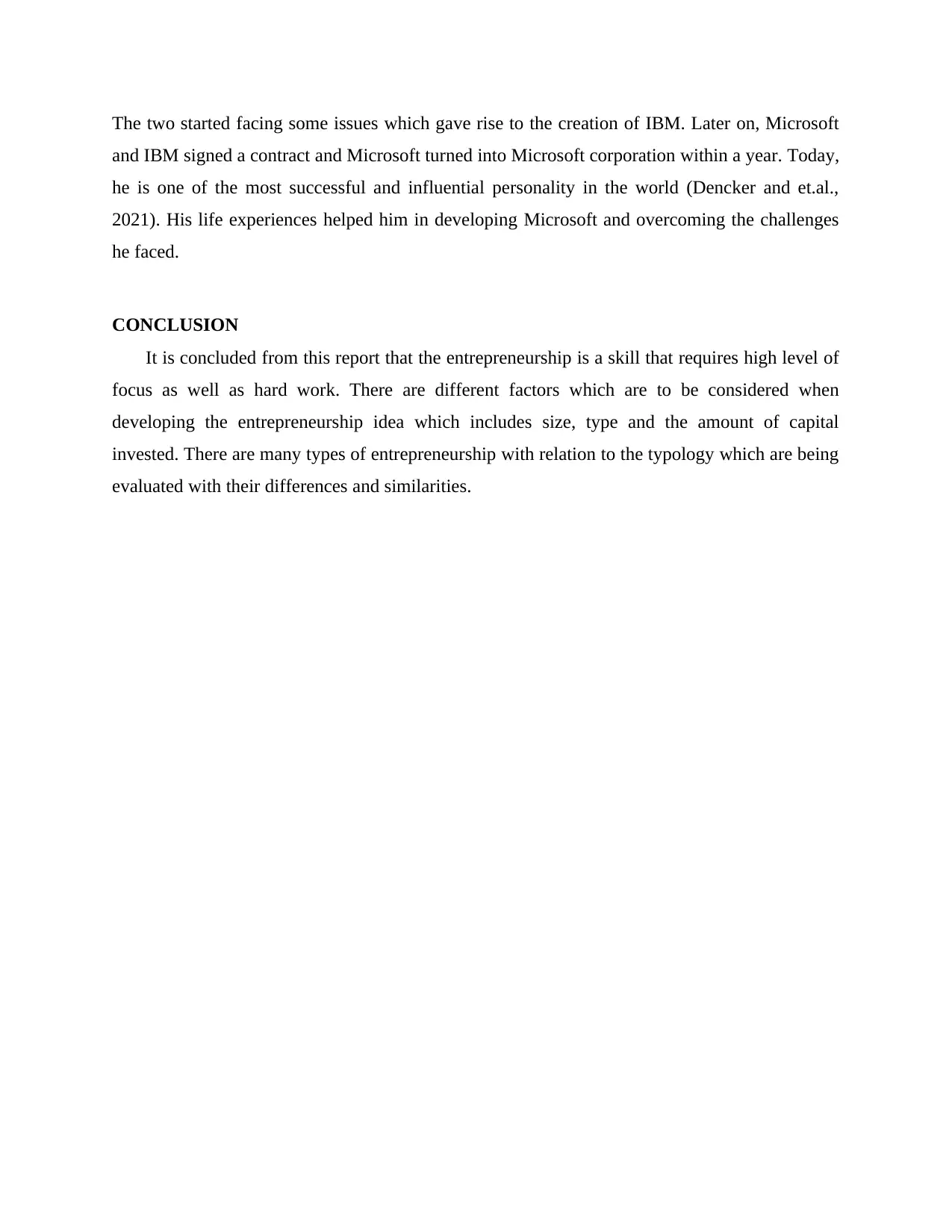
The two started facing some issues which gave rise to the creation of IBM. Later on, Microsoft
and IBM signed a contract and Microsoft turned into Microsoft corporation within a year. Today,
he is one of the most successful and influential personality in the world (Dencker and et.al.,
2021). His life experiences helped him in developing Microsoft and overcoming the challenges
he faced.
CONCLUSION
It is concluded from this report that the entrepreneurship is a skill that requires high level of
focus as well as hard work. There are different factors which are to be considered when
developing the entrepreneurship idea which includes size, type and the amount of capital
invested. There are many types of entrepreneurship with relation to the typology which are being
evaluated with their differences and similarities.
and IBM signed a contract and Microsoft turned into Microsoft corporation within a year. Today,
he is one of the most successful and influential personality in the world (Dencker and et.al.,
2021). His life experiences helped him in developing Microsoft and overcoming the challenges
he faced.
CONCLUSION
It is concluded from this report that the entrepreneurship is a skill that requires high level of
focus as well as hard work. There are different factors which are to be considered when
developing the entrepreneurship idea which includes size, type and the amount of capital
invested. There are many types of entrepreneurship with relation to the typology which are being
evaluated with their differences and similarities.
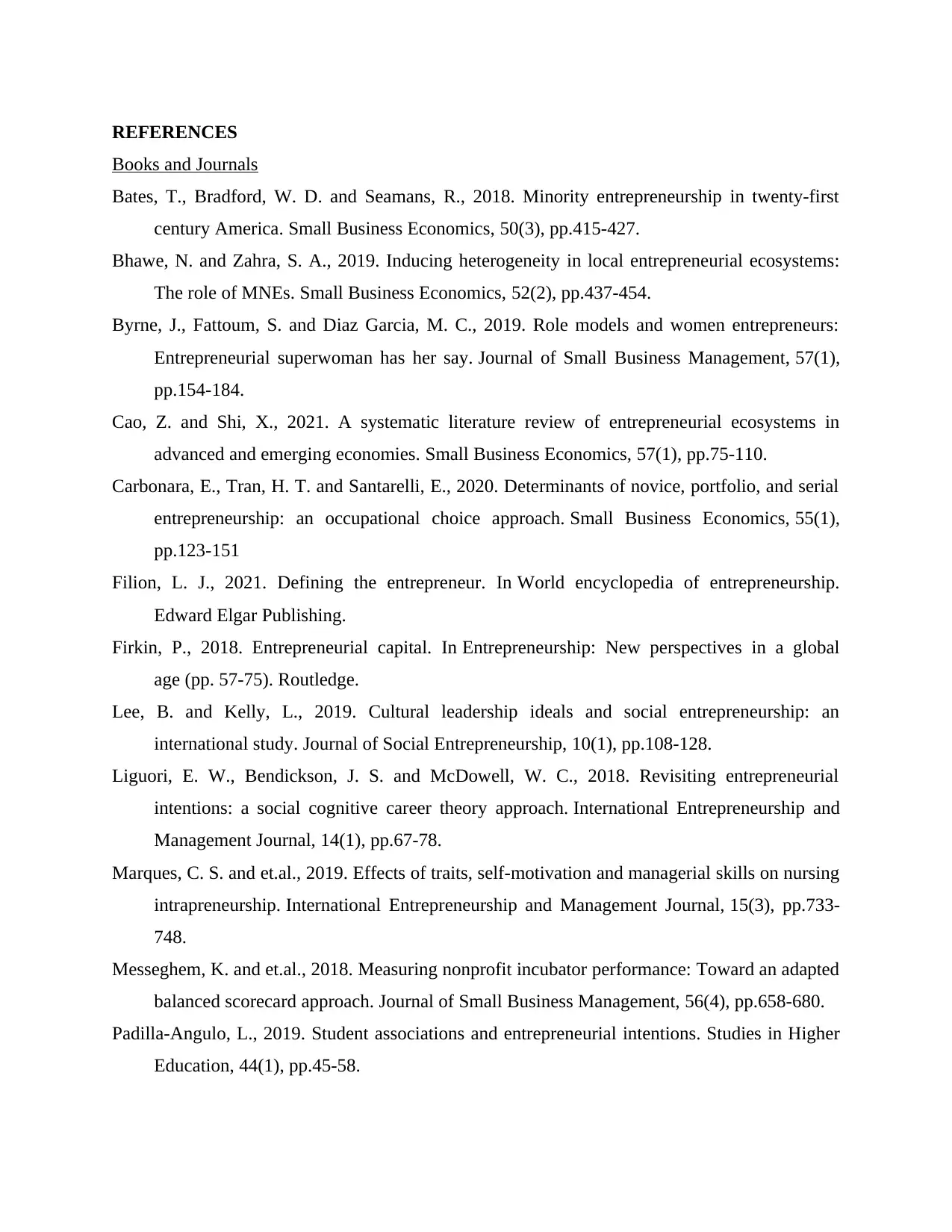
REFERENCES
Books and Journals
Bates, T., Bradford, W. D. and Seamans, R., 2018. Minority entrepreneurship in twenty-first
century America. Small Business Economics, 50(3), pp.415-427.
Bhawe, N. and Zahra, S. A., 2019. Inducing heterogeneity in local entrepreneurial ecosystems:
The role of MNEs. Small Business Economics, 52(2), pp.437-454.
Byrne, J., Fattoum, S. and Diaz Garcia, M. C., 2019. Role models and women entrepreneurs:
Entrepreneurial superwoman has her say. Journal of Small Business Management, 57(1),
pp.154-184.
Cao, Z. and Shi, X., 2021. A systematic literature review of entrepreneurial ecosystems in
advanced and emerging economies. Small Business Economics, 57(1), pp.75-110.
Carbonara, E., Tran, H. T. and Santarelli, E., 2020. Determinants of novice, portfolio, and serial
entrepreneurship: an occupational choice approach. Small Business Economics, 55(1),
pp.123-151
Filion, L. J., 2021. Defining the entrepreneur. In World encyclopedia of entrepreneurship.
Edward Elgar Publishing.
Firkin, P., 2018. Entrepreneurial capital. In Entrepreneurship: New perspectives in a global
age (pp. 57-75). Routledge.
Lee, B. and Kelly, L., 2019. Cultural leadership ideals and social entrepreneurship: an
international study. Journal of Social Entrepreneurship, 10(1), pp.108-128.
Liguori, E. W., Bendickson, J. S. and McDowell, W. C., 2018. Revisiting entrepreneurial
intentions: a social cognitive career theory approach. International Entrepreneurship and
Management Journal, 14(1), pp.67-78.
Marques, C. S. and et.al., 2019. Effects of traits, self-motivation and managerial skills on nursing
intrapreneurship. International Entrepreneurship and Management Journal, 15(3), pp.733-
748.
Messeghem, K. and et.al., 2018. Measuring nonprofit incubator performance: Toward an adapted
balanced scorecard approach. Journal of Small Business Management, 56(4), pp.658-680.
Padilla-Angulo, L., 2019. Student associations and entrepreneurial intentions. Studies in Higher
Education, 44(1), pp.45-58.
Books and Journals
Bates, T., Bradford, W. D. and Seamans, R., 2018. Minority entrepreneurship in twenty-first
century America. Small Business Economics, 50(3), pp.415-427.
Bhawe, N. and Zahra, S. A., 2019. Inducing heterogeneity in local entrepreneurial ecosystems:
The role of MNEs. Small Business Economics, 52(2), pp.437-454.
Byrne, J., Fattoum, S. and Diaz Garcia, M. C., 2019. Role models and women entrepreneurs:
Entrepreneurial superwoman has her say. Journal of Small Business Management, 57(1),
pp.154-184.
Cao, Z. and Shi, X., 2021. A systematic literature review of entrepreneurial ecosystems in
advanced and emerging economies. Small Business Economics, 57(1), pp.75-110.
Carbonara, E., Tran, H. T. and Santarelli, E., 2020. Determinants of novice, portfolio, and serial
entrepreneurship: an occupational choice approach. Small Business Economics, 55(1),
pp.123-151
Filion, L. J., 2021. Defining the entrepreneur. In World encyclopedia of entrepreneurship.
Edward Elgar Publishing.
Firkin, P., 2018. Entrepreneurial capital. In Entrepreneurship: New perspectives in a global
age (pp. 57-75). Routledge.
Lee, B. and Kelly, L., 2019. Cultural leadership ideals and social entrepreneurship: an
international study. Journal of Social Entrepreneurship, 10(1), pp.108-128.
Liguori, E. W., Bendickson, J. S. and McDowell, W. C., 2018. Revisiting entrepreneurial
intentions: a social cognitive career theory approach. International Entrepreneurship and
Management Journal, 14(1), pp.67-78.
Marques, C. S. and et.al., 2019. Effects of traits, self-motivation and managerial skills on nursing
intrapreneurship. International Entrepreneurship and Management Journal, 15(3), pp.733-
748.
Messeghem, K. and et.al., 2018. Measuring nonprofit incubator performance: Toward an adapted
balanced scorecard approach. Journal of Small Business Management, 56(4), pp.658-680.
Padilla-Angulo, L., 2019. Student associations and entrepreneurial intentions. Studies in Higher
Education, 44(1), pp.45-58.
Paraphrase This Document
Need a fresh take? Get an instant paraphrase of this document with our AI Paraphraser
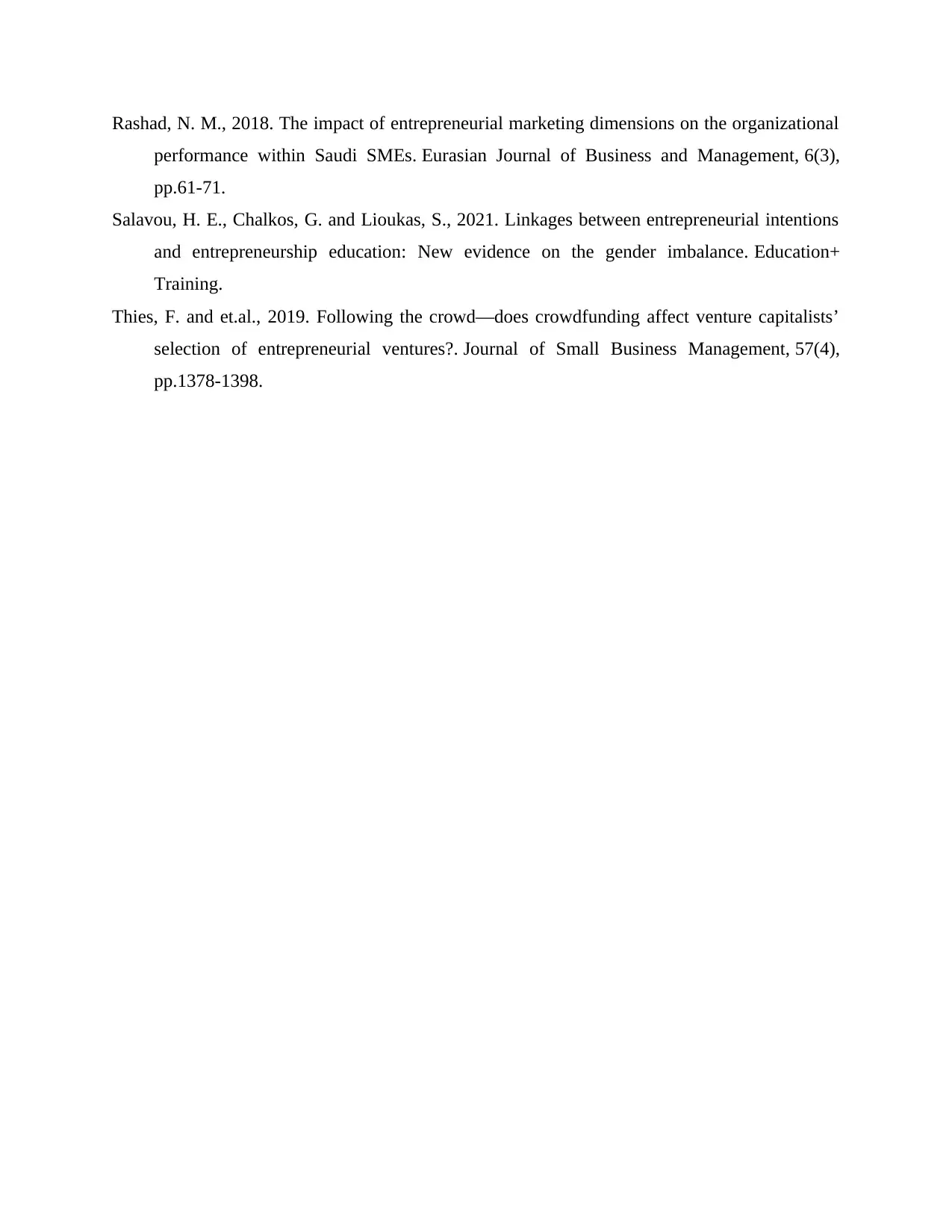
Rashad, N. M., 2018. The impact of entrepreneurial marketing dimensions on the organizational
performance within Saudi SMEs. Eurasian Journal of Business and Management, 6(3),
pp.61-71.
Salavou, H. E., Chalkos, G. and Lioukas, S., 2021. Linkages between entrepreneurial intentions
and entrepreneurship education: New evidence on the gender imbalance. Education+
Training.
Thies, F. and et.al., 2019. Following the crowd—does crowdfunding affect venture capitalists’
selection of entrepreneurial ventures?. Journal of Small Business Management, 57(4),
pp.1378-1398.
performance within Saudi SMEs. Eurasian Journal of Business and Management, 6(3),
pp.61-71.
Salavou, H. E., Chalkos, G. and Lioukas, S., 2021. Linkages between entrepreneurial intentions
and entrepreneurship education: New evidence on the gender imbalance. Education+
Training.
Thies, F. and et.al., 2019. Following the crowd—does crowdfunding affect venture capitalists’
selection of entrepreneurial ventures?. Journal of Small Business Management, 57(4),
pp.1378-1398.
1 out of 14
Related Documents
Your All-in-One AI-Powered Toolkit for Academic Success.
+13062052269
info@desklib.com
Available 24*7 on WhatsApp / Email
![[object Object]](/_next/static/media/star-bottom.7253800d.svg)
Unlock your academic potential
© 2024 | Zucol Services PVT LTD | All rights reserved.




